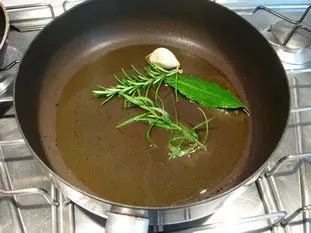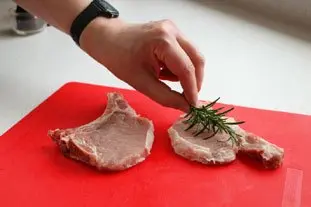This site uses only a few technical cookies necessary for its operation. By continuing to browse, you accept their use.
To find out more...
To find out more...
Rosemary in recipes

Rosemary, as I’m sure you know, is a culinary herb, one of the famous French "herbes de Provence", and is very effective in bringing a real taste of the Mediterranean to any dish.
The classic way to use it in a recipe is to add a sprig or two and leave it in during cooking as a way of capturing the full flavour.
The classic way to use it in a recipe is to add a sprig or two and leave it in during cooking as a way of capturing the full flavour.
24 K 4.7/5 (15 reviews)
Keywords for this post:RosemaryHerbsProvenceFranceUseRecipesTasteLast modified on: April 18th 2018
Rosemary in recipes
But with rosemary there are two slight problems:
1) Rosemary, rather like bay leaves, is difficult to eat. The thick stem is usually woody and hard, and the needle-like leaves are tough, even after cooking.
2) After they have been cooking for a while, the leaves fall off the stem and get mixed into the dish. They are not ideal to eat, as I was saying, so can be unpleasant when they end up in a mouthful. Trying to sort them out of the food is an irksome task.
With such drawbacks, one might be forgiven for wanting to give up using rosemary all together, but that would be a pity, as the flavour is so good. Fortunately, there’s a solution…
The trick is a simple one, and it’s this: imagine you are making a tomato sauce, as you might knock up in advance for home-made pizzas (a real must!). Midway through cooking, once the tomatoes start to look like a proper sauce, add the sprig(s) of rosemary as planned and leave in the sauce – but only for five minutes, then remove and discard.
This will give your sauce plenty of rosemary flavour, but without leaving the nasty hard bits of herb mentioned above. Five minutes may not sound like very long, but it’s enough, as you will see.
You can do the same with thyme, but this is less necessary, as the leaves are very small and quite easy to eat.
If you are not making a sauce, but cooking meat, for example, the method is even simpler: just rub the rosemary over the meat. This might seem odd or inadequate, but it really is enough – try it out for yourself.
To sum up: When using sprigs of rosemary in a recipe, just rub over the food, or leave in the pan while cooking for no longer than five minutes.
1) Rosemary, rather like bay leaves, is difficult to eat. The thick stem is usually woody and hard, and the needle-like leaves are tough, even after cooking.
2) After they have been cooking for a while, the leaves fall off the stem and get mixed into the dish. They are not ideal to eat, as I was saying, so can be unpleasant when they end up in a mouthful. Trying to sort them out of the food is an irksome task.
With such drawbacks, one might be forgiven for wanting to give up using rosemary all together, but that would be a pity, as the flavour is so good. Fortunately, there’s a solution…
The trick is a simple one, and it’s this: imagine you are making a tomato sauce, as you might knock up in advance for home-made pizzas (a real must!). Midway through cooking, once the tomatoes start to look like a proper sauce, add the sprig(s) of rosemary as planned and leave in the sauce – but only for five minutes, then remove and discard.

This will give your sauce plenty of rosemary flavour, but without leaving the nasty hard bits of herb mentioned above. Five minutes may not sound like very long, but it’s enough, as you will see.
You can do the same with thyme, but this is less necessary, as the leaves are very small and quite easy to eat.
If you are not making a sauce, but cooking meat, for example, the method is even simpler: just rub the rosemary over the meat. This might seem odd or inadequate, but it really is enough – try it out for yourself.

To sum up: When using sprigs of rosemary in a recipe, just rub over the food, or leave in the pan while cooking for no longer than five minutes.
Lasts posts
XO Cognac Explained: Meaning, Aging, and Flavor Profile
XO Cognac always goes beyond the labels on the bottle: it is often associated with tradition and quality. You get to appreciate the artistry, character and ageing process when you understand what defines this smooth Cognac. The section below tackles everything about XO Cognac, from complex flavour...January 28th 20261,049 Sponsored article
Butter vs. grease
We often read in a recipe where a pastry is put into a mould that, just before pouring, the mould should be buttered or greased. But what's the difference between these 2 terms?December 1st 20252,6585
Getting out of the fridge early
Very often when you're cooking, you need to take food or preparations out of the fridge, to use them in the recipe in progress. There's nothing tricky about this: you just take them out of the fridge and use them, usually immediately, in the recipe. But is this really a good method?November 24th 20251,7035
Who's making the croissants?
When you look at a bakery from the outside, you naturally think that in the bakery, the bakers make the bread, and in the laboratory, the pastry chefs make the cakes. It's very often like that, with each of these professions having quite different ways of working, but sometimes there's also one...November 23th 20251,558
Oven height
When we put a dish or cake in the oven, we naturally tend to put it on the middle shelf, and that's what we usually do. But in some cases, this position and height can be a little tricky, so let's find out why.October 8th 20255,2745
Other pages you may also like
Steam for baking bread
What does steam have to do with bread-making? This is not only a bakers' secret, it is something you might not think of at all: if you make bread and bake it like a cake, you will end up with bread, but pale and with a thick, hard crust – a long way from the golden-brown crusty loaf you had in...June 16th 2021149 K4.5
The super powers of cornstarch
I start this new year by evoking an old product, that you most probably have in your cupboards, a white powder, often in a small cardboard package with a slightly outdated look, only the "gluten free" is relatively recent, it is simply cornstarch, hence its name of maïzena. It's used for a lot...January 14th 202216 K
Well-cooked meat
Have you ever noticed that if you like your meat well done, it invites strange looks? For instance, in a restaurant, when asked “How would you like that cooked?” If you reply, “Well done,” it is almost as if you are swearing….May 21th 201134 K 14.4
The art of the charlotte
In cooking, a charlotte is a delicious moulded dessert, with biscuits around the outside that have been soaked in a flavoured syrup, filled with a light cream or mousse. The charlotte is left to set in the fridge before being turned out and served in slices. It is very light and a lovely sweet...February 27th 201347 K4.3
Preserving egg yolks
If you're using only the egg whites in a recipe (such as meringues ), you'll need to store the yolks until you're ready to use them again. There's nothing very complicated about this in principle - all you have to do is chill them, but there are a few pitfalls to be avoided in practice.June 18th 20248,7095
Post a comment or question
Follow this page
If you are interested in this page, you can "follow" it, by entering your email address here. You will then receive a notification immediately each time the page is modified or a new comment is added. Please note that you will need to confirm this following.
Note: We'll never share your e-mail address with anyone else.
Alternatively: you can subscribe to the mailing list of cooling-ez.com , you will receive a e-mail for each new recipe published on the site.









